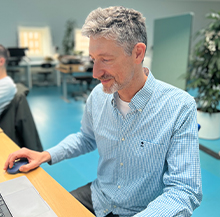What can Danish startups (not) learn from Silicon Valley?
![]()
"Software is eating the world."
American entrepreneur Marc Andreessen wrote this in a now quite famous essay ten years ago.
Today we know he was right.
It's been a long time since bookstores had to surrender themselves to the software-driven Amazon, and we watch TV and listen to music via streaming services. The most recent addition is AI-powered image generators like Dall-E and MidJourney which challenge traditional illustrators, artists and photographers.
All of this has been driven by the so-called 'Silicon Valley model', where it is essential to target the entire market as soon as possible through software.
(Time and technological developments have been on Silicon Valley's side. Where stores used to rely on support from the local community, the development of smartphones made it very easy to reach a global market – if you knew how to build a software business. And that's exactly what Silicon Valley companies specialise in.)
"Silicon Valley wants to turn the whole world into software and scale up businesses as quickly as possible. The focus is on quantity – how do we reach as many people as possible – rather than quality, where we put ourselves in the shoes of the users and spend time understanding their needs," says Jonathan P. Allen, Visiting Professor at the Department of Digitalization at Copenhagen Business School and Professor at the University of San Francisco.
At first glance, it looks like Silicon Valley, the area in San Francisco Bay where Apple, Google, Netflix and many other companies are located, goes about it in the right way. But should Danish tech start-ups replicate the success of the Silicon Valley model?
Danish startups enter an infrastructure controlled by American companies
The first thing you need to know is that Silicon Valley has already taken over a large part of the global software market, so small new start-ups must navigate the existing infrastructure.
"Silicon Valley has defined the entire playing field for new start-ups. They offer you all sorts of free tools when you are a new player in the market, but once you start making money, they are going to claim what is theirs. It is a collaboration where David will not destroy Goliath but only make him bigger," says Jonathan P. Allen.
If you, for instance, own a webshop, you can make use of Amazon's warehouses and logistics subject to a charge.
So, Allen’s advice is to be clear from the very beginning on how much you wish to depend on big companies. Do you want to build your business from scratch, or is it okay to depend on other people's services – now and later?
Denmark has a smaller market
The advantage of the Silicon Valley model is that companies can be scaled up quickly for a large customer group. However, in Denmark, the market size is not the same, so perhaps it is still better for Danish startups to focus more on building expert knowledge about the special needs of customer groups than on the broad market?
"Denmark has a long tradition of design and engineering. And there is a huge market for industrial robots which Silicon Valley has not yet taken over. The success criterion is not as simple as a 'like button'. The machines must meet specialised needs and be able to work with humans. There is a lot of artificial intelligence involved in teaching robots to navigate physical environments."
Remember: They are great in Silicon Valley, but they are not super geniuses
The last piece of advice from Jonathan P. Allen is to not be too scared of the big companies in Silicon Valley. Even though they generally control the software battle, they are not super geniuses.
"We cannot deny that they have been overtaken by TikTok, which is a Chinese social media. And social media should be Silicon Valley's domain. Additionally, everything they touch does not in fact turn into gold. Google keeps trying to get us to wear their Google Goggles, and Silicon Valley has wasted billions of dollars on e-scooters that remain to be successful."
The e-scooters are available under the name Lime in Denmark. The company started up in Silicon Valley in San Francisco, California.
Together with Mads Bødker, Associate Professor at the Department of Digitalization at CBS, and Kenneth Salomonsen, Funding & Partnership Manager at Copenhagen School of Entrepreneurship at CBS, Jonathan P. Allen shares several points on what we can learn (and not learn) from Silicon Valley at the Digital Tech Summit 2022.
Digital Tech Summit takes place on 25-26 October and you can sign up here.
